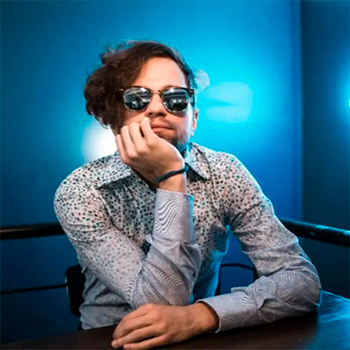

MØ
(real name — Karen Marie Aagaard Ørsted Andersen)
MØ is a Danish singer, songwriter, and producer whose music has become a symbol of modern Nordic pop sound. Her style combines electropop, indie synth, punk energy, and the emotional lyricism of the Scandinavian school. Over more than a decade, MØ has gone from the DIY punk scene of Odense to global charts and major festival stages.
Early Life and Beginnings
Karen Marie Ørsted was born on August 13, 1988, in the small town of Ubberud near Odense, Denmark. She grew up in a family of teachers and psychologists, surrounded by music — from classical jazz to punk. At seven, she began writing her own melodies inspired by Spice Girls and No Doubt, and as a teenager she became passionate about punk rock and counterculture.
In high school, Karen formed an electro-punk duo called MOR with a friend, performing in small clubs and festivals. This period shaped her artistic identity — independent, bold, and emotionally raw.
Solo Career Beginnings
In 2012, MØ released her first solo demos, quickly catching the attention of the music industry. The following year, she released her debut EP “Bikini Daze”, and the single “Pilgrim” became a local hit in Denmark, bringing her into the spotlight of the European pop scene.
In 2014 came her debut album “No Mythologies to Follow” — an emotional and experimental blend of synth-pop, R&B, and electro-indie. The album received critical acclaim for its freshness, sincerity, and MØ’s distinctive voice.
Global Breakthrough
MØ achieved worldwide fame in 2015 as the co-writer and vocalist of the international superhit “Lean On” by Major Lazer & DJ Snake. The song topped charts in over 20 countries, became one of the most streamed tracks of the decade, and established her as a global star.
She later released the solo hit “Final Song”, solidifying her place as one of pop’s leading voices. The track reached the top of charts in the UK, Australia, and Scandinavia, and its music video went viral.
Evolution and Maturity
After her breakthrough, MØ continued to explore the balance between mainstream and alternative music.
-
2018 — the second album “Forever Neverland”, exploring themes of growing up, inner anxiety, and nostalgia.
-
2022 — the third album “Motordrome”, reflecting personal crisis and rebirth after emotional burnout. The record was praised for its honesty and lyrical strength.
-
2025 — the upcoming release “Plæygirl”, where MØ fuses electronic textures with lyrical synth-pop and experimental sounds.
Musical Style
MØ’s sound thrives on contrasts: gentle vocals against gritty electronic textures, melodic warmth meeting punk energy. She merges Northern melancholy, house-inspired rhythm, and indie-style emotional honesty.
Her lyrics are introspective and sincere, touching on identity, fragility, and freedom. Her style has influenced a new wave of Scandinavian artists, inspiring performers like Tove Lo, Astrid S, and Sigrid.
Discography
| Year | Album | Format / Key Tracks |
|---|---|---|
| 2013 | Bikini Daze (EP) | Pilgrim, Never Wanna Know |
| 2014 | No Mythologies to Follow | Waste of Time, Don’t Wanna Dance, Glass |
| 2015 | Lean On (with Major Lazer & DJ Snake) | Global superhit, over 3 billion streams |
| 2016 | Final Song | Solo hit, became a summer festival anthem |
| 2018 | Forever Neverland | Blur, Sun in Our Eyes, Imaginary Friend |
| 2022 | Motordrome | Live to Survive, Brad Pitt, Kindness |
| 2025 | Plæygirl | Saturn Returns, One More Dream — the new sound of MØ |
Awards and Achievements
| Year | Award / Organization | Category / Work |
|---|---|---|
| 2014 | Danish Music Awards | “Best New Artist”, “Best Pop Album” |
| 2015 | MTV Europe Music Awards | “Best Danish Act” |
| 2016 | GAFFA Awards | “Song of the Year” (Final Song) |
| 2017 | Billboard Music Awards | Nomination for Lean On as “Best Dance Video” |
| 2018 | European Border Breakers Award | “Breakthrough in Europe” |
| 2022 | Nordic Music Prize | Nomination for Motordrome |
| 2024 | P3 Guld Awards (Denmark) | “Artist of the Decade” |
Interesting Facts
-
The stage name MØ comes from her surname Ørsted and means “maiden” or “youth” in Danish.
-
Before global fame, she studied visual media at the Royal Danish Academy of Fine Arts.
-
Parts of her first album were recorded in her parents’ bedroom using an old microphone and a laptop.
-
After the success of Lean On, she took a step back to restore emotional balance and rediscover her voice.
-
MØ actively advocates for women’s rights and speaks openly about mental health and authenticity in art.
Conclusion
MØ is an artist who has proven that it’s possible to be vulnerable and authentic without losing strength or charisma. Her journey is a story of courage — staying true to herself despite the pressures of fame and the industry.
From small punk clubs in Odense to millions of listeners worldwide, MØ’s path has been filled with exploration, doubt, and triumph. Her music is the voice of a generation seeking freedom, balance, and humanity in the digital age.
She is more than a singer — she’s a symbol of modern Nordic pop culture, where emotion matters more than form, and sincerity outweighs any trend.





















